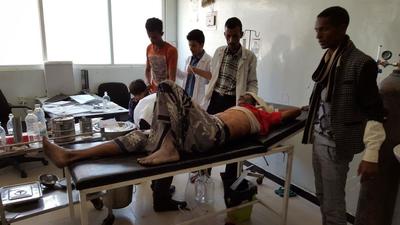Dorassio is 23. He is among the many victims of the inter-communal violence taking place in the Central African Republic today. On 18th January, he was shot in the arm in Bouar, in the country’s northwest region. His arm had to be amputated.
He was treated by Médecins Sans Frontières/Doctors Without Borders (MSF) in Bouar, and then transferred by plane to the Bangui Community Hospital, where our surgical teams continue to monitor his condition.
Surgery in CAR
MSF has been managing surgical emergencies at the hospital since early December, treating an average of 140 patients every week. One-third of them are hospitalised so that they can be operated on.
Our surgical activities focus on victims of violence (including injuries from gunshots, knife attacks, grenade explosions and arrows). The patients’ prognosis for survival is often uncertain.
In many cases, patients will, unfortunately, suffer permanent consequences from open fractures and complex wounds.
In a poor country, where there is no treatment for people with disabilities, what kind of future will Dorassio have?
Photostory: Amputation in CAR
Dorassio waits to be moved into the operating room at the Community Hospital. This will be his fifth operation since he arrived at the hospital.
The surgical team moves him into the operating room and places him on the operating table.
Although the procedure lasts only 20 minutes, it is stressful for the patient. Dressing wounds is very painful and requires a general anaesthetic so that the surgical team can clean the wound and change the dressing.
Dorassio is in the recovery room for an hour, alongside MSF’s other surgical patients. The surgical team will perform more than 10 operations over the course of the day. All of these patients are considered serious cases – whether in terms of their survival or continued functioning.
Dorassio’s older sister, Cynthia, comes every day to provide support, help him wash and eat, and keep him company.
To address the inflow of patients in recent weeks, MSF teams have set up tents in the courtyard of the Community Hospital for patients receiving post-operative care. There are more than 80 patients here. The wait between treatment and surgery is often long. Dorassio practices writing with his other hand to become a writer and tell his story.





